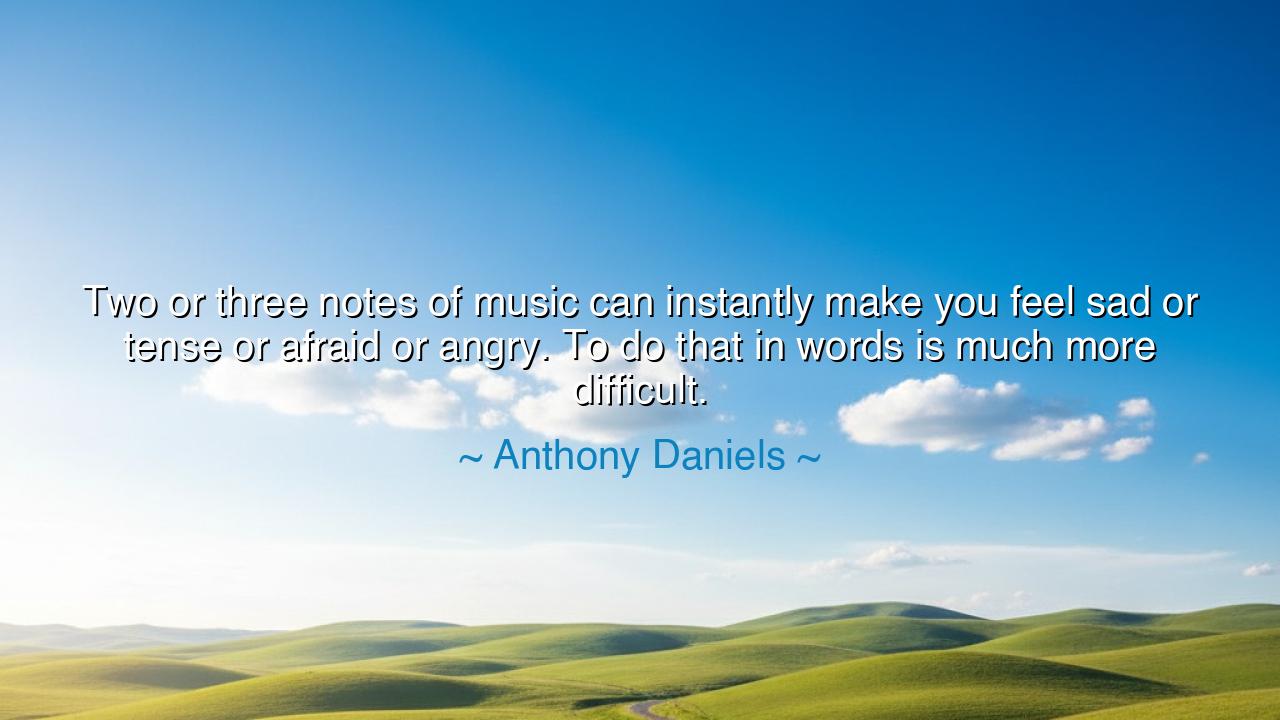
Two or three notes of music can instantly make you feel sad or
Two or three notes of music can instantly make you feel sad or tense or afraid or angry. To do that in words is much more difficult.






Hearken, children of reflection, to the words of Anthony Daniels, who observes: "Two or three notes of music can instantly make you feel sad or tense or afraid or angry. To do that in words is much more difficult." In these words lies a meditation upon the power of sound, the subtlety of emotional resonance, and the extraordinary ability of music to reach the soul directly, bypassing reason and striking the heart. Since the days of the ancients, philosophers and poets have pondered the mysterious force of music and its unparalleled capacity to move the human spirit.
The ancients understood that music is a language older than words. Plato, in his Republic, spoke of the ethical and emotional power of music, warning that its rhythms and melodies shape character and emotion, guiding the soul toward virtue or vice. Daniels’ observation echoes this timeless wisdom: a few notes of music carry a directness and immediacy that written or spoken words often struggle to convey. Emotion, he suggests, is easier awakened in sound than in syntax, because music speaks to the depths of the human heart with immediacy and purity.
Consider the example of Orpheus, whose lyre could charm beasts, soothe angered gods, and even influence the course of rivers. His music had the power to evoke fear, sadness, or joy with a few well-chosen notes, demonstrating that melody touches the soul in ways that the most eloquent speech cannot. Daniels’ insight reminds us that music’s potency lies in its ability to convey emotion directly, unmediated by intellectual analysis, transcending the limitations of language.
Yet the quote also reflects on the challenge and artistry of words. While a melody can instantly stir anger or tension, a writer or orator must labor carefully to evoke equivalent responses through words. Cicero, in his speeches, demonstrated mastery over language to move crowds emotionally, but even he would recognize that the immediacy of music’s impact is unique. Language requires structure, nuance, and patience to achieve the visceral power that a single chord or motif can deliver in an instant.
The quote also highlights a broader philosophical truth: human emotion is both fragile and responsive, capable of being shaped by subtle cues. Music activates memory, expectation, and instinct in ways that words alone often cannot, reaching directly into the emotional matrix of the listener. Daniels’ statement teaches that art, in its many forms, serves as a conduit between human experience and expression, each medium with its own strengths and limitations.
From this reflection emerges a timeless lesson: recognize the extraordinary power of music and other nonverbal arts to convey emotion and meaning. While language and writing remain vital tools for communication, they often require deliberate effort to achieve what music accomplishes naturally. To move others deeply, one must understand both the medium and the nature of human feeling, whether through melody, gesture, or the carefully chosen word.
Practical actions follow naturally. Engage with music as a teacher of emotion, observing how melodies evoke feeling, shape mood, and influence thought. Study how composers and performers manipulate rhythm, harmony, and tone to guide the listener’s heart. Similarly, when using words, strive to mirror music’s emotional resonance through tone, cadence, and imagery, understanding that language is powerful but demands precision to match the immediacy of musical notes.
Remember, children of the ages, that the language of the heart often precedes the language of reason. Anthony Daniels’ words illuminate the eternal truth that music possesses a unique and immediate power over human emotion, capable of evoking sadness, tension, fear, or anger in an instant. By observing and learning from this power, we cultivate both emotional awareness and the ability to communicate more profoundly, honoring the timeless interplay between sound, feeling, and human understanding.






AAdministratorAdministrator
Welcome, honored guests. Please leave a comment, we will respond soon